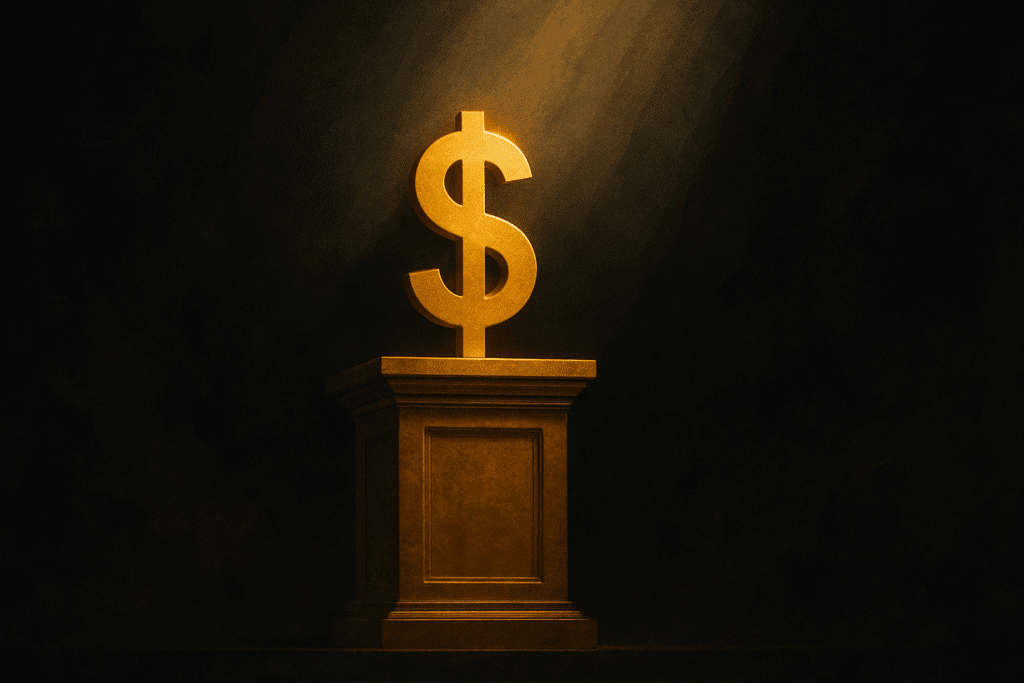Introduction

Napoleon Hill’s Think and Grow Rich is often regarded as the holy grail of self-help literature. Since its first release in 1937, it has sold over 100 million copies and earned a near-religious following among entrepreneurs, coaches, and motivational speakers. To this day, it’s quoted like scripture in business seminars and self-improvement circles.
But behind the glossy promises lies a much murkier reality.
Hill claimed his book was the result of interviews with 500 of the most successful men of his time — names like Andrew Carnegie, Henry Ford, and Thomas Edison. Yet there’s no solid proof that most of these conversations ever happened. More troubling, the book’s central idea — that simply thinking positively can attract wealth — has helped popularize a culture of magical thinking, toxic positivity, and unrealistic expectations.
This isn’t just a critique of one influential book — it’s a deeper look at the seductive, often harmful ideology behind much of modern “success thinking.” It’s time to question the myths we’ve been sold — and the damage they continue to do.
1. The Carnegie Lie: A Mythical Origin Story

Napoleon Hill built the entire premise of Think and Grow Rich around a dramatic claim: that steel tycoon Andrew Carnegie personally commissioned him to spend 25 years interviewing 500 of the world’s most successful men. This elite list supposedly included legends like Thomas Edison, Henry Ford, and Alexander Graham Bell. Hill’s mission? To uncover and share the timeless secrets of wealth and achievement.
It’s a powerful backstory. But there’s one major problem — there’s no credible evidence it ever happened.
The Missing Pieces
- No letters, agreements, or official records tie Carnegie to Hill in any documented way.
- Neither Carnegie’s personal archives nor the work of respected biographers mention Hill at all.
- The interviews Hill claimed with figures like Edison and Ford are unverifiable and, in many cases, highly suspect.
Why It Matters
This isn’t just a minor detail or marketing fluff. The Carnegie connection is the cornerstone of Think and Grow Rich. It lends the book an air of legitimacy and historical gravitas — the idea that Hill’s wisdom was handed down from the titans of the industrial age.
Without that mythical endorsement, Hill’s authority crumbles. He becomes not a chosen messenger of greatness, but just another voice in the crowded self-help world.
As one critic put it, Hill “built an empire on a handshake that never happened.”
2. The Law of Attraction: Magical Thinking Disguised as Strategy

One of the central themes in Think and Grow Rich is the idea that thoughts can shape reality. Hill suggests that if you focus intensely on a desire, visualize it clearly, and believe deeply enough, the universe will align to bring it into your life. This concept later evolved into what’s widely known today as the Law of Attraction.
But here’s the reality: this so-called “law” isn’t grounded in science—it’s a repackaging of mystical thinking, presented as a formula for success. And while it may sound empowering, it often does more harm than good.
The Problem with the Law of Attraction
1. It’s Not Science—It’s Pseudoscience
There’s no credible scientific evidence that thoughts alone can cause external outcomes. The Law of Attraction is rooted in 19th-century metaphysical philosophy, not in modern neuroscience or psychology. Despite this, it’s frequently marketed by self-styled gurus and influencers who profit from selling vague promises and emotional uplift, rather than results.
2. It Encourages Victim-Blaming
If your mindset alone determines your success or failure, then poverty, illness, or misfortune must be the result of your own negative thinking. This idea creates a toxic feedback loop, where people blame themselves for circumstances beyond their control. It reduces complex life challenges to personal “vibration levels” and silences real pain by labeling it as weakness or negativity.
3. It Undermines Critical Thinking and Action
Instead of promoting strategic planning, resilience, or practical problem-solving, the Law of Attraction often encourages blind faith in the universe. Followers are told to trust, visualize, and “feel aligned”—instead of adjusting to setbacks or making informed decisions. In extreme cases, this mindset has even been linked to manipulation tactics used by cult-like groups or unethical coaches.
The Real Danger: False Empowerment
The Law of Attraction creates an illusion of control. It promises that mindset alone can shape outcomes, but when real life doesn’t cooperate, followers are left confused, ashamed, and blaming themselves for not “thinking positively” enough. As noted by Psychology Today, it’s a seductive belief system—until reality breaks through the fantasy.
3. The Success Formula: Oversimplified and Unscientific
In Think and Grow Rich, Napoleon Hill outlines a 13-step formula he claims can unlock wealth and personal greatness. His approach is framed as universal and timeless—principles like “Desire,” “Faith,” “Autosuggestion,” and “Persistence” are presented as the key ingredients to achieving anything.
At first glance, this structure feels empowering. But under scrutiny, Hill’s formula is built less on proven insight and more on anecdote, motivational flair, and speculative philosophy.
What Hill Gets Wrong
1. It Lacks Scientific Grounding
Hill’s ideas are not based on credible research from psychology, sociology, or behavioral science. Terms like “autosuggestion” and “faith” may sound compelling, but they’re not measurable or testable in any rigorous sense. Decades of academic research show that success depends on a complex mix of factors—ranging from upbringing and opportunity to timing and networks. Mindset alone doesn’t determine outcomes.
2. It Ignores Structural Inequality
Hill’s philosophy assumes a level playing field—that anyone can succeed by simply thinking the right thoughts and following the right steps. But this view dismisses real, systemic challenges like racism, gender inequality, economic disparity, and generational disadvantage. The result is a narrative that can unfairly place blame on individuals who struggle, even when their obstacles are structural, not personal.
3. It Conflicts with Modern Success Research
Contemporary researchers paint a very different picture of how success actually works. In The Formula: The Universal Laws of Success, network scientist Albert-László Barabási shows that achievement is not just about personal effort. It’s also about how others perceive that effort, the timing of opportunities, and the strength of one’s social network. In short, success is as much about external dynamics as it is about individual willpower.
A More Realistic View
True success isn’t just a matter of positive thinking or persistence. It’s a product of complex, interdependent forces—including visibility, context, relationships, and luck. As Barabási puts it, “Success is not a solo journey. It’s a collective phenomenon shaped by visibility, timing, and social context.”
4. The Cult of Wealth: Morality Replaced by Money

One of the more troubling legacies of Think and Grow Rich is its contribution to a worldview where wealth is seen not only as desirable, but as inherently virtuous. Napoleon Hill doesn’t just frame financial success as a goal—he elevates it to the status of spiritual achievement. In doing so, he helped lay the groundwork for what critics now call the “cult of wealth”: a belief system in which money becomes the measure of personal worth, and success is conflated with morality.
What Hill Taught
Hill consistently equates the pursuit of wealth with purpose and higher consciousness. His use of religious language to describe financial ambition frames getting rich as a sacred mission. At the same time, he suggests that poverty stems from weak thinking or lack of belief, reinforcing the idea that riches are a reward for mental discipline and spiritual alignment.
This mindset has rippled through modern culture—from prosperity gospel movements in religion to questionable “wealth coaching” industries online—creating an entire ecosystem where financial gain is treated as proof of inner strength or divine favor.
Why It’s Harmful
1. It Moralizes Wealth and Stigmatizes Poverty
Hill’s philosophy implies that success is earned and deserved, while failure is a personal flaw. In societies marked by systemic inequality, this message becomes especially damaging. It shifts blame onto individuals rather than acknowledging structural barriers. Research has even shown that increased wealth can reduce empathy and foster unethical behavior—challenging the idea that the rich are inherently more disciplined or virtuous.
2. It Prioritizes Results Over Ethics
Hill’s framework focuses on the outcome—accumulating wealth—without questioning the means. There’s little room for moral reflection on how money is made, or what impact that wealth has on others. This opens the door for justifying exploitation, manipulation, or unethical business practices under the banner of “success.” In reality, many people wrestle with the ethics of profiting in industries that don’t serve the public good—an inner conflict Hill’s model ignores.
3. It Encourages Consumerism and Status Obsession
By tying personal value to financial achievement, Hill’s teachings reinforce a materialist culture where net worth becomes a proxy for self-worth. This philosophy fuels constant comparison, status anxiety, and the belief that more is always better. It aligns neatly with consumer capitalism: keep striving, keep spending, and if you haven’t made it, the fault is yours.
A Cultural Shift Is Needed
As some critics have argued, the modern obsession with money operates less like a financial strategy and more like a belief system. When wealth becomes an object of worship, it replaces values like community, empathy, and integrity with competition and personal branding. The result isn’t just economic inequality—it’s a society where meaning is measured in metrics, not human connection.
5. The Legacy: From Self-Help to Self-Blame
Think and Grow Rich wasn’t just a book—it was the blueprint for an entire industry. Its ideas echo across modern self-help culture, from life coaching and manifestation trends to the rise of online “success” influencers. But perhaps its most damaging legacy is the subtle shift it introduced: turning the promise of personal empowerment into a culture of chronic self-blame.
How It Happens
1. When Success Becomes a Mindset, Failure Becomes a Personal Flaw
Hill teaches that wealth is the natural result of belief, desire, and mental focus. But what happens when someone does everything “right” and still doesn’t succeed? Instead of examining structural or external barriers, the blame often falls inward. People are told they didn’t believe hard enough, visualize correctly, or maintain the right energy. The result is a pattern of guilt, shame, and internalized failure.
2. The Boom of Mindset Coaching and Manifestation Culture
Hill’s influence laid the foundation for the modern manifestation movement, where success is sold as a frequency to be tuned into. Today, entire industries revolve around selling “abundance mindsets,” “vibrational alignment,” and mental rewiring—all marketed as keys to wealth. When these tools fail to deliver, the response is often to buy more courses, sign up for more coaching, or keep “raising your frequency.” The model becomes self-perpetuating—and profitable for those selling it.
3. From Self-Help to Self-Surveillance
The modern self-help movement has increasingly turned inward, encouraging people to constantly monitor their own thoughts and emotions for signs of weakness or limitation. As noted by EverBe Therapy, this creates a cycle of self-punishment, where individuals blame themselves for every setback, ignoring real-world causes like inequality, trauma, or pure bad luck. The result is not empowerment—but an endless loop of shame, over-responsibility, and spending in search of personal “fixes.”
The Psychological Toll
When self-help becomes self-surveillance, the emotional consequences are real. Constant self-blame leads to chronic stress, low self-worth, and a distorted sense of control. As EverBe Therapy explains, “Self-blame is often a chronic pattern of taking on the emotional burden for everything that goes wrong. It’s learned, reinforced, and deeply damaging.”
Conclusion: Think and Grow Rich — A Bestseller Built on Belief, Not Truth
Napoleon Hill’s Think and Grow Rich is more than just a bestselling book—it’s a cornerstone of the self-help genre and a key influence on decades of motivational culture. It has inspired millions, launched careers, and shaped the way people think about success. But its influence rests on shaky ground.
Beneath the inspirational tone and compelling narrative lies a troubling foundation:
- Invented stories of mentorship from industrial icons like Carnegie and Edison
- Pseudoscientific claims about thoughts manifesting reality
- A worldview that equates wealth with virtue, ignoring ethics and inequality
- A philosophy that turns failure into personal blame, reinforcing shame instead of understanding
Think and Grow Rich doesn’t offer a real roadmap to success. It sells the belief that mindset alone can transcend any obstacle—regardless of context, privilege, or external conditions. In doing so, it transforms hope into a product, and struggle into a personal shortcoming.
As one critic aptly put it: The book doesn’t teach you how to succeed—it teaches you how to believe in success, even when that belief is untethered from reality.
So if you choose to read it, read with caution—not reverence. Understand the historical context, challenge its assumptions, and separate its motivational energy from its factual claims.
Because real personal growth doesn’t come from magical thinking. It comes from clear-eyed reflection, honest effort, and a willingness to face the world as it actually is—not as we’ve been sold it should be.
📚 Real Alternatives to Think and Grow Rich:
| Book | Author | Why It’s Valuable |
| The Psychology of Money | Morgan Housel | Offers timeless lessons on behavior, risk, and decision-making, grounded in psychology and economics. |
| Grit | Angela Duckworth | Explores the role of sustained effort and resilience, backed by empirical research—not empty affirmations. |
| The Formula: The Universal Laws of Success | Albert-László Barabási | Uses data and network science to explain how success emerges from performance, visibility, and timing. |
| Deep Work | Cal Newport | Focuses on attention, productivity, and meaningful achievement—without relying on vague mindset jargon. |
| So Good They Can’t Ignore You | Cal Newport | Debunks the “follow your passion” myth, showing how mastery and rare skills drive long-term success. |
| Atomic Habits | James Clear | A practical, research-based framework for building habits that lead to real, measurable change. |
| Winners Take All | Anand Giridharadas | Exposes the contradictions in elite-driven success narratives and challenges the morality of modern capitalism. |
| Outliers | Malcolm Gladwell | Highlights how background, timing, and social conditions shape success—countering the myth of pure meritocracy. |
FAQ’s
Did Napoleon Hill really interview Andrew Carnegie and other tycoons?
No. There is no reliable evidence that Hill ever spoke with Andrew Carnegie—or with most of the other industrialists he claims to have interviewed. Historians and Carnegie’s biographers have found no contracts, letters, or documented meetings to support Hill’s story. The “500 millionaires” claim is widely regarded as a fabrication.
Is the Law of Attraction a scientifically proven concept?
No. The Law of Attraction is not supported by scientific research. It stems from 19th-century metaphysical beliefs, not psychology or neuroscience. The idea that thoughts can directly attract wealth or success has been widely debunked by behavioral scientists and is considered a form of magical thinking—not a practical strategy.
If the book is so flawed, why is it still popular?
Because it offers a simple, emotionally compelling promise: that belief alone can change your life. In times of uncertainty, people gravitate toward messages that feel empowering, even if they aren’t realistic. Its continued popularity has more to do with marketing appeal and cultural repetition than factual accuracy.
Is there any reason to read Think and Grow Rich today?
Yes—but with caution. The book is best understood as a historical artifact, not a guide to real-world success. It played a major role in shaping the modern self-help industry, and reading it can offer insight into how motivational culture developed. But its claims should be challenged and balanced with evidence-based alternatives.
What are the risks of taking Hill’s advice literally?
There are several:
Victim-blaming: If success is purely mental, then failure becomes your fault.
Financial vulnerability: People may fall for expensive coaching, scams, or programs built on Hill-style thinking.
Emotional damage: Believing mindset alone determines your outcome can lead to shame, burnout, and self-doubt when reality doesn’t match the promise.
